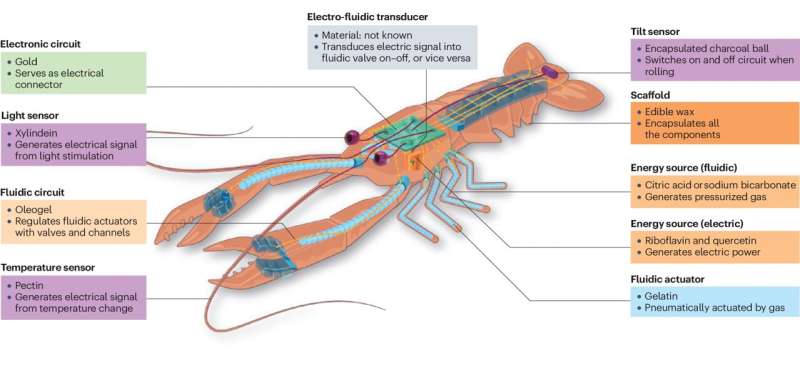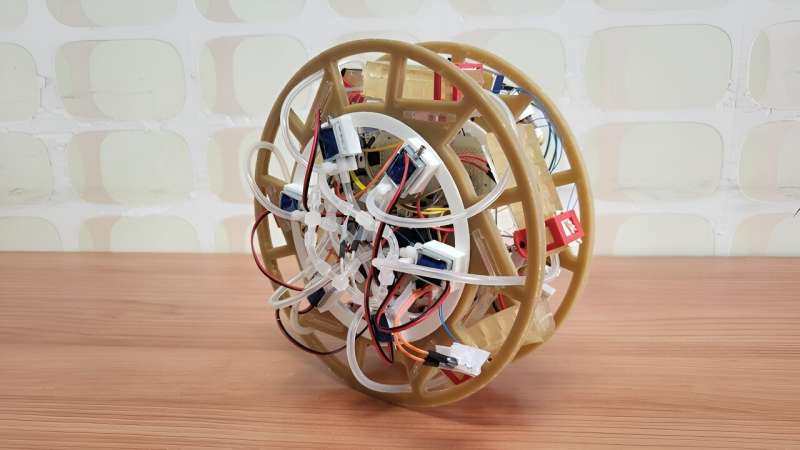
A fully edible robot could soon end up on our plate if we overcome some technical hurdles, say EPFL scientists involved in RoboFood—a project which aims to marry robots and food.
Robots and food have long been distant worlds: Robots are inorganic, bulky, and non-disposable; food is organic, soft, and biodegradable. Yet, research that develops edible robots has progressed recently and promises positive impacts: Robotic food could reduce electronic waste, help deliver nutrition and medicines to people and animals in need, monitor health, and even pave the way to novel gastronomical experiences.
But how far are we from having a fully edible robot for lunch or dessert? And what are the challenges? Scientists from the RoboFood project, based at EPFL, address these and other questions in a perspective article in the journal Nature Reviews Materials.
"Bringing robots and food together is a fascinating challenge," says Dario Floreano, director of the Laboratory of Intelligent Systems at EPFL and first author of the article. In 2021, Floreano joined forces with Remko Boom from Wageningen University, The Netherlands, Jonathan Rossiter from the University of Bristol, UK, and Mario Caironi from the Italian Institute of Technology, to launch the project RoboFood.
In the perspective article, RoboFood authors analyze which edible ingredients can be used to make edible robot parts and whole robots, and discuss the challenges of making them.
"We are still figuring out which edible materials work similarly to non-edible ones," says Floreano. For example, gelatin can replace rubber, rice cookies are akin to foam, a chocolate film can protect robots in humid environments, and mixing starch and tannin can mimic commercial glues.

These and other edible materials make up the ingredients of robotic components. "There is a lot of research on single edible components like actuators, sensors, and batteries," says Bokeon Kwak, a postdoc in the group of Floreano and one of the authors.
In 2017, EPFL scientists successfully produced an edible gripper, a gelatin-made structure that could handle an apple and be eaten afterward. EPFL, IIT, and the University of Bristol recently developed a new conductive ink that can be sprayed on food to sense its growth. The ink contains activated carbon as a conductor, while Haribo gummy bears are used as a binder. Other sensors can perceive pH, light, and bending.
In 2023, IIT researchers realized the first rechargeable edible battery using riboflavin (vitamin B2) and quercetin (found in almonds and capers) in the battery poles, adding activated carbon to facilitate electron transport and nori algae, used to wrap sushi, to prevent short circuits. Packaged with beeswax, the 4 cm wide edible battery can operate at 0.65 volts, still a safe voltage in case of ingestion; two edible batteries connected in series can power a light-emitting diode for about 10 minutes.
More information: Dario Floreano et al, Towards edible robots and robotic food, Nature Reviews Materials (2024). DOI: 10.1038/s41578-024-00688-9
Citation: A fully edible robot could soon end up on our plate, say scientists (2024, June 14) retrieved 14 June 2024 from https://techxplore.com/news/2024-06-fully-edible-robot-plate-scientists.html
This document is subject to copyright. Apart from any fair dealing for the purpose of private study or research, no part may be reproduced without the written permission. The content is provided for information purposes only.
